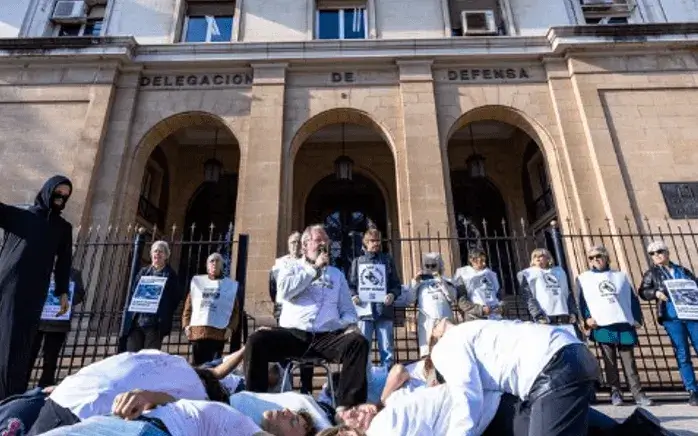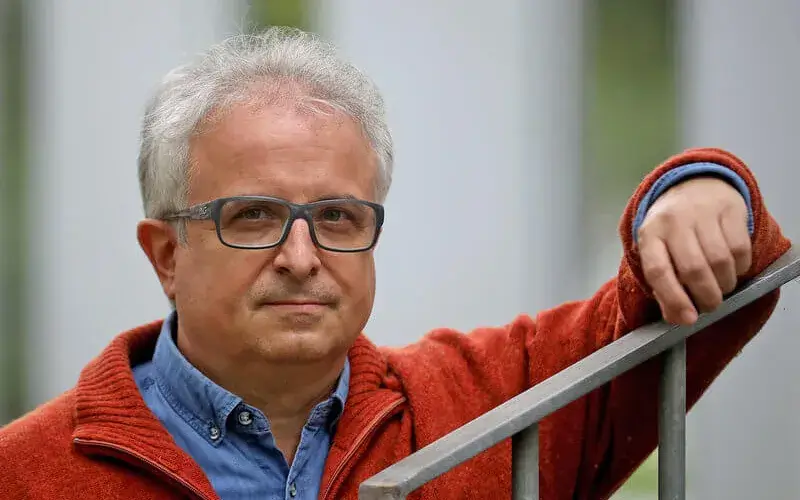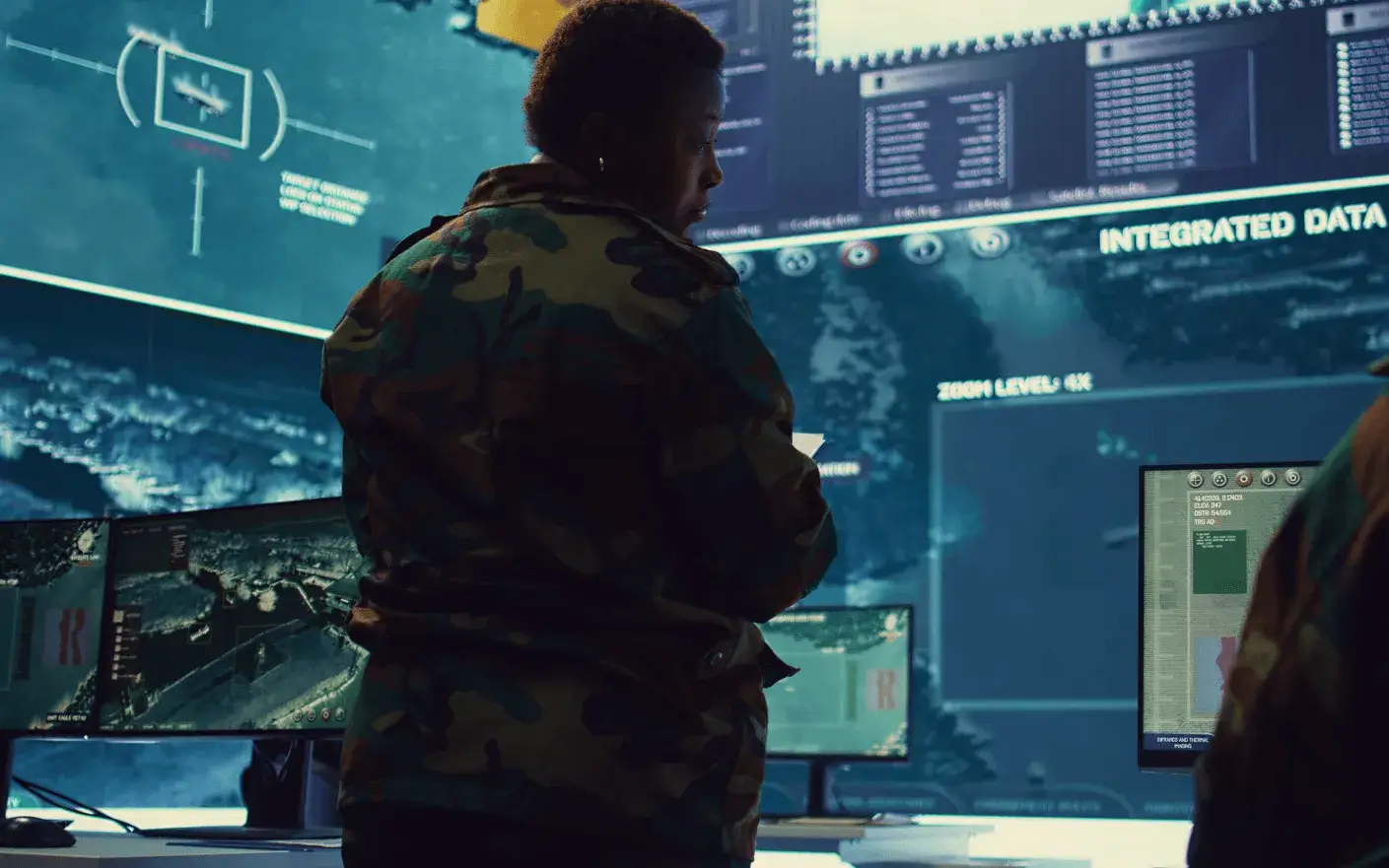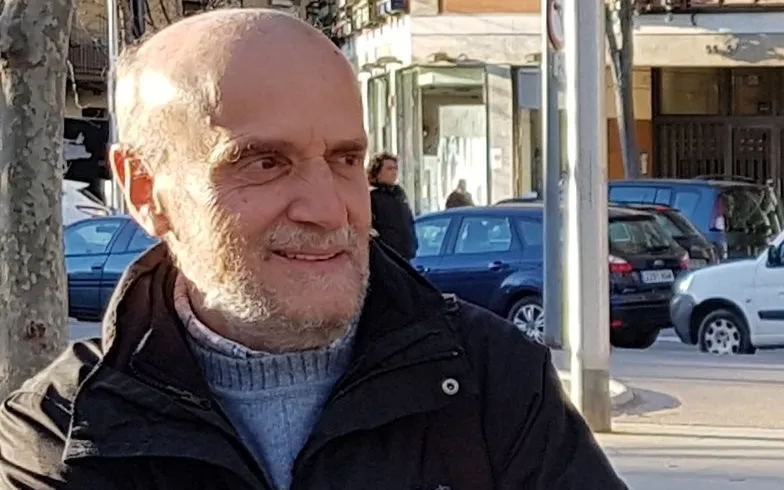Interview
Martí Olivella: “We cannot continue to be indifferent to the misery and the constant death we see every day"
Image

The activist and driving force behind the non‑violent struggle denounces the complicity of political, economic and media powers in the business of war and issues a call to organize from the grassroots to build a real alternative to militarism.
“Today I am overcome by shame, shame at being a man, a white man, and European. Shame… at being human", declared Martí Olivella on behalf of the ‘Aturemlesguerres.cat’ campaign from the lectern of the international ‘Cry for Peace’ meeting, organized in Gernika to commemorate the 88th anniversary of the bombing carried out against the Biscayan population by the Condor Legion of Nazi Germany and the Legionary Aviation of Fascist Italy. At the same time, the veteran peace activist asked himself, “How is it possible that in the 21st century there are leaders—and peoples who follow them—who still believe that by preparing for war they build peace?”.
With a clear, uncomfortable, and tireless speech, Martí Olivella, driving force of the 'Aturemlesguerres.cat' movement, insists that it is not enough to protest or express indignation in the face of barbarity: one must organize, disobey, and weave a network of nonviolent resistance throughout the territory. Faced with the rise of militarism and the complicity of governments, media, and corporations, he advocates for a citizen counterpower that leaves passivity behind and recovers the strength of collective consciousness and action.
It has been more than two and a half years since you launched the ‘Aturemlesguerres.cat’ campaign. How do you assess its impact?
We were born with the aim of enabling part of the population to channel their anger about what is happening in Ukraine, Gaza, and so many other places around the world in a way that is manageable given their capabilities. The idea was to do it differently, not so linked to traditional forms of protest—like organizing a demonstration, issuing a manifesto, and then going home—but through permanent and persevering pressure. I think we have achieved this in about twenty towns and cities in Catalonia, bringing together groups of people who have mobilized every week.
What have you achieved with these mobilizations?
On the surface, it might seem like nothing, but what has been done is to weave relationships and generate trust that have given rise to new actions emerging here and there. Little by little, people have strengthened this bond based on perseverance and confronting a giant from a position of smallness. From the human and political standpoint of everything it means to establish a network of permanent relationships, I think it is a great success. I say this because the alternative—what most people do—is stay at home, sit on the sofa, curse everything, and little else.
Has this network of relationships allowed you to go further?
Considering the blockade we face from the media, where we do not appear, the relational path has led to things happening to us that we could not have imagined. For example, former minister Miguel Ángel Moratinos invited us to defend our position at the event organized in Gernika to commemorate the fascist bombings of April 1937.
But the reality that imposes itself is that militarism is gaining ground and every day there are new and more violent conflicts…
As I said in the Gernika speech, this responds to the interests of the military-industrial complex, which today is also political, media, and financial, and to its eagerness to do business—whether with the pharmaceutical industry, housing, the green revolution, or now with armaments. Capital always seeks where to create demand, and it does it very well, because they all move together and share the profits.
Stoking fear is a recurring strategy of power to obtain political returns.
For politicians, it is always useful to increase fear, to grow the feeling of insecurity, and to exaggerate threats because this always produces a more docile citizenry, closed in on their own issues and more powerless to think that nothing can be done to change things. And therefore, they find it easier to impose on the population this discourse of remilitarization and rearmament.
With a clear, uncomfortable, and tireless speech, Martí Olivella, driving force of the 'Aturemlesguerres.cat' movement, insists that it is not enough to protest or express indignation in the face of barbarity: one must organize, disobey, and weave a network of nonviolent resistance throughout the territory. Faced with the rise of militarism and the complicity of governments, media, and corporations, he advocates for a citizen counterpower that leaves passivity behind and recovers the strength of collective consciousness and action.
It has been more than two and a half years since you launched the ‘Aturemlesguerres.cat’ campaign. How do you assess its impact?
We were born with the aim of enabling part of the population to channel their anger about what is happening in Ukraine, Gaza, and so many other places around the world in a way that is manageable given their capabilities. The idea was to do it differently, not so linked to traditional forms of protest—like organizing a demonstration, issuing a manifesto, and then going home—but through permanent and persevering pressure. I think we have achieved this in about twenty towns and cities in Catalonia, bringing together groups of people who have mobilized every week.
What have you achieved with these mobilizations?
On the surface, it might seem like nothing, but what has been done is to weave relationships and generate trust that have given rise to new actions emerging here and there. Little by little, people have strengthened this bond based on perseverance and confronting a giant from a position of smallness. From the human and political standpoint of everything it means to establish a network of permanent relationships, I think it is a great success. I say this because the alternative—what most people do—is stay at home, sit on the sofa, curse everything, and little else.
Has this network of relationships allowed you to go further?
Considering the blockade we face from the media, where we do not appear, the relational path has led to things happening to us that we could not have imagined. For example, former minister Miguel Ángel Moratinos invited us to defend our position at the event organized in Gernika to commemorate the fascist bombings of April 1937.
But the reality that imposes itself is that militarism is gaining ground and every day there are new and more violent conflicts…
As I said in the Gernika speech, this responds to the interests of the military-industrial complex, which today is also political, media, and financial, and to its eagerness to do business—whether with the pharmaceutical industry, housing, the green revolution, or now with armaments. Capital always seeks where to create demand, and it does it very well, because they all move together and share the profits.
Stoking fear is a recurring strategy of power to obtain political returns.
For politicians, it is always useful to increase fear, to grow the feeling of insecurity, and to exaggerate threats because this always produces a more docile citizenry, closed in on their own issues and more powerless to think that nothing can be done to change things. And therefore, they find it easier to impose on the population this discourse of remilitarization and rearmament.
Perhaps the most sensible thing would be to work to prevent conflicts before they erupt…
In all conflicts one must go to the origin; we cannot remain stuck in the circumstances. Neither the conflict between Ukraine and Russia began two and a half years ago, nor did Gaza begin on October 7. One must always have a broader view of history and seek the origins of things.
In the case of the European Union, how can one preach for peace and at the same time launch an €800 billion rearmament plan?
Here many people have taken off their masks and act without any shame. We, for example, have launched a campaign—we have drafted a letter—against the first ‘Iberian Forum for Peace and Security in Europe,’ organized by Prensa Ibérica and chaired by the President of the Generalitat, with the presence of the Mayor of Barcelona, Minister Jordi Hereu, and companies like Indra, among others. It is the perfect definition of the military, political, media, and industrial complex, which has no scruples about getting its hands, its work, and its blood-stained capital dirty for the sake of profit. It is the infamy of the traffickers of death.
Faced with this, you are a staunch defender of nonviolent struggle.
They have taught us that if political, economic, and military power is very strong, citizens have little choice but to bow our heads and obey. Nonviolent struggle, precisely, reverses these terms. Gandhi or Martin Luther King said it: those who are powerful politically, militarily, and economically are so because we, the people, give them our consent—because we obey, cooperate, work for them, pay taxes, and vote for them… For the sake of our own comfort, we are collaborators with the lords of war, whether political, military, industrial, or journalistic. Nonviolent struggle inverts that and shows us that citizens have far more strength than we think.
We can look to past experiences.
Exactly: it’s about empowering ourselves as a society, as conscientious objectors did. Didn’t it seem impossible that a bunch of bearded youths could stand up to an entire Francoist army? Yet they managed to gather a million objectors, 50,000 insubordinates, and within thirty years ended compulsory military service. We have that experience. When people organize and refuse to cooperate—boycott, strike, abstain from voting or paying taxes—they have far more power than they believe.
Is it increasingly difficult to mobilize people?
What I cannot understand at all is that 600,000 people can take to the streets to celebrate Barça’s titles, and yet we remain completely indifferent to the misery and constant death we see every day. I want to resign from this country because, as I said in the speech I gave in Gernika, I am ashamed to be a man, white, and European—and I should add, Catalan too.
You propose creating a network of self‑defense cells as an alternative to violent military defense.
The essence of nonviolent struggle is changing the conception of where power lies. It’s about creating a counter‑power within organized society. But how do you organize a distracted and insensitive society? You can only build on what already exists. In every neighborhood, town, and city there are people with conscience who confront the racist, sexist, environmental, or labor aggressions we suffer, who are organizing to defend the territory in its broadest sense.
Therefore, what is needed is to join forces.
All these people already practice—or draw inspiration, more or less explicitly—from nonviolent struggle. It’s about forming a network, a fabric, which we call nonviolent self‑defense cells, groups, or circles. We lack that collective consciousness, which would be the foundation of a nonviolent civil or popular self‑defense system, and which, in the case of an occupation, would not have to improvise the response, as has happened in Ukraine or so many other places, like Prague in 1968. Just as armed military defense systems prepare in peacetime, nonviolent defense must also be prepared in peacetime.
They are two opposing strategies.
In the first case we have already seen that it requires spending €800 billion and involving all social sectors to feed the traffickers of death. Nonviolent defense, on the other hand, is cheap and depends on the strength of the people. It is about defending ourselves without killing, without destroying or attacking. It is a paradigm shift.
Now it is time to move into action.
We call on groups that already defend rights and freedoms to self‑organize and connect with each other, even if they fight for different causes. The goal is to weave a network of nonviolent defense that will allow us to be prepared to face crises—whether a war or a climate catastrophe—without having to improvise. We live in a fairy‑tale country thinking we are under no danger or threat, but reality is very different.
These things shouldn’t happen, yet they do, and if you don’t believe me, ask Ukrainians, who the day before the war began were living happily. We cannot continue to trust blindly that the State, with its great complexity and corruption, will solve everything for us; people must take the initiative to improve their daily lives and strengthen resilience in the face of situations that may occur.
It can be done through simple actions.
We, the first objectors—who had done nothing together for fifty years—have launched the ‘Conscience Against War’ campaign, in which we want to convey the message that demonstrations and manifestos are fine, but we must organize a nonviolent struggle operation to start reversing things. We cannot remain at the level of mere complaint.
For example, let us vote consciously only for parties that unequivocally distance themselves from war, militarism, and rearmament. The same goes for taxes: we can oppose war but then pay the taxes that finance the rearmament plan. They now ask us for not 2 percent of GDP for defense, but 5 percent. Well, let us practice fiscal insubordination. Our consciousness as citizens in all these areas is what gives us power.
Are you optimistic about the future?
Each person must do what they believe they should do. Gandhi said that the difference between what we do and what we could do would change the world. We cannot wait for others to pull the chestnuts out of the fire for us. Today we are fully aware of what is happening in the world, we have all the information, we know what our governments and companies are doing, and we cannot excuse ourselves as in other times. If we do not act, it will not be from ignorance but from omission. And history will tell us that we were on the wrong side. If we do what we have to do, the world may not be perfect, but at least it will not be our fault for not having tried.
In all conflicts one must go to the origin; we cannot remain stuck in the circumstances. Neither the conflict between Ukraine and Russia began two and a half years ago, nor did Gaza begin on October 7. One must always have a broader view of history and seek the origins of things.
In the case of the European Union, how can one preach for peace and at the same time launch an €800 billion rearmament plan?
Here many people have taken off their masks and act without any shame. We, for example, have launched a campaign—we have drafted a letter—against the first ‘Iberian Forum for Peace and Security in Europe,’ organized by Prensa Ibérica and chaired by the President of the Generalitat, with the presence of the Mayor of Barcelona, Minister Jordi Hereu, and companies like Indra, among others. It is the perfect definition of the military, political, media, and industrial complex, which has no scruples about getting its hands, its work, and its blood-stained capital dirty for the sake of profit. It is the infamy of the traffickers of death.
Faced with this, you are a staunch defender of nonviolent struggle.
They have taught us that if political, economic, and military power is very strong, citizens have little choice but to bow our heads and obey. Nonviolent struggle, precisely, reverses these terms. Gandhi or Martin Luther King said it: those who are powerful politically, militarily, and economically are so because we, the people, give them our consent—because we obey, cooperate, work for them, pay taxes, and vote for them… For the sake of our own comfort, we are collaborators with the lords of war, whether political, military, industrial, or journalistic. Nonviolent struggle inverts that and shows us that citizens have far more strength than we think.
We can look to past experiences.
Exactly: it’s about empowering ourselves as a society, as conscientious objectors did. Didn’t it seem impossible that a bunch of bearded youths could stand up to an entire Francoist army? Yet they managed to gather a million objectors, 50,000 insubordinates, and within thirty years ended compulsory military service. We have that experience. When people organize and refuse to cooperate—boycott, strike, abstain from voting or paying taxes—they have far more power than they believe.
Is it increasingly difficult to mobilize people?
What I cannot understand at all is that 600,000 people can take to the streets to celebrate Barça’s titles, and yet we remain completely indifferent to the misery and constant death we see every day. I want to resign from this country because, as I said in the speech I gave in Gernika, I am ashamed to be a man, white, and European—and I should add, Catalan too.
You propose creating a network of self‑defense cells as an alternative to violent military defense.
The essence of nonviolent struggle is changing the conception of where power lies. It’s about creating a counter‑power within organized society. But how do you organize a distracted and insensitive society? You can only build on what already exists. In every neighborhood, town, and city there are people with conscience who confront the racist, sexist, environmental, or labor aggressions we suffer, who are organizing to defend the territory in its broadest sense.
Therefore, what is needed is to join forces.
All these people already practice—or draw inspiration, more or less explicitly—from nonviolent struggle. It’s about forming a network, a fabric, which we call nonviolent self‑defense cells, groups, or circles. We lack that collective consciousness, which would be the foundation of a nonviolent civil or popular self‑defense system, and which, in the case of an occupation, would not have to improvise the response, as has happened in Ukraine or so many other places, like Prague in 1968. Just as armed military defense systems prepare in peacetime, nonviolent defense must also be prepared in peacetime.
They are two opposing strategies.
In the first case we have already seen that it requires spending €800 billion and involving all social sectors to feed the traffickers of death. Nonviolent defense, on the other hand, is cheap and depends on the strength of the people. It is about defending ourselves without killing, without destroying or attacking. It is a paradigm shift.
Now it is time to move into action.
We call on groups that already defend rights and freedoms to self‑organize and connect with each other, even if they fight for different causes. The goal is to weave a network of nonviolent defense that will allow us to be prepared to face crises—whether a war or a climate catastrophe—without having to improvise. We live in a fairy‑tale country thinking we are under no danger or threat, but reality is very different.
These things shouldn’t happen, yet they do, and if you don’t believe me, ask Ukrainians, who the day before the war began were living happily. We cannot continue to trust blindly that the State, with its great complexity and corruption, will solve everything for us; people must take the initiative to improve their daily lives and strengthen resilience in the face of situations that may occur.
It can be done through simple actions.
We, the first objectors—who had done nothing together for fifty years—have launched the ‘Conscience Against War’ campaign, in which we want to convey the message that demonstrations and manifestos are fine, but we must organize a nonviolent struggle operation to start reversing things. We cannot remain at the level of mere complaint.
For example, let us vote consciously only for parties that unequivocally distance themselves from war, militarism, and rearmament. The same goes for taxes: we can oppose war but then pay the taxes that finance the rearmament plan. They now ask us for not 2 percent of GDP for defense, but 5 percent. Well, let us practice fiscal insubordination. Our consciousness as citizens in all these areas is what gives us power.
Are you optimistic about the future?
Each person must do what they believe they should do. Gandhi said that the difference between what we do and what we could do would change the world. We cannot wait for others to pull the chestnuts out of the fire for us. Today we are fully aware of what is happening in the world, we have all the information, we know what our governments and companies are doing, and we cannot excuse ourselves as in other times. If we do not act, it will not be from ignorance but from omission. And history will tell us that we were on the wrong side. If we do what we have to do, the world may not be perfect, but at least it will not be our fault for not having tried.






Add new comment